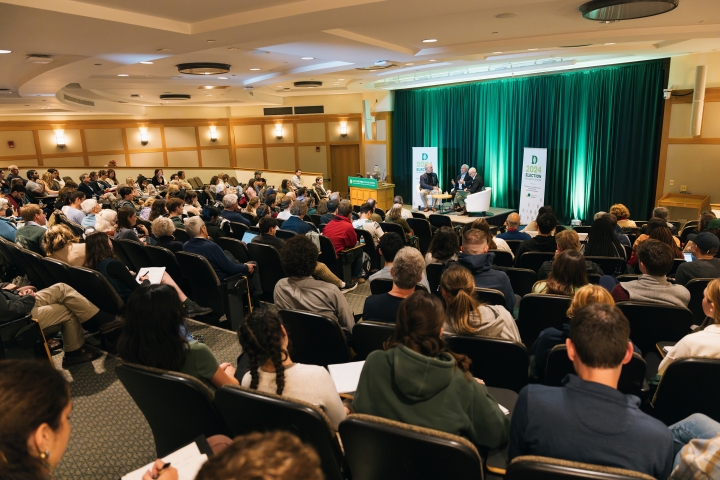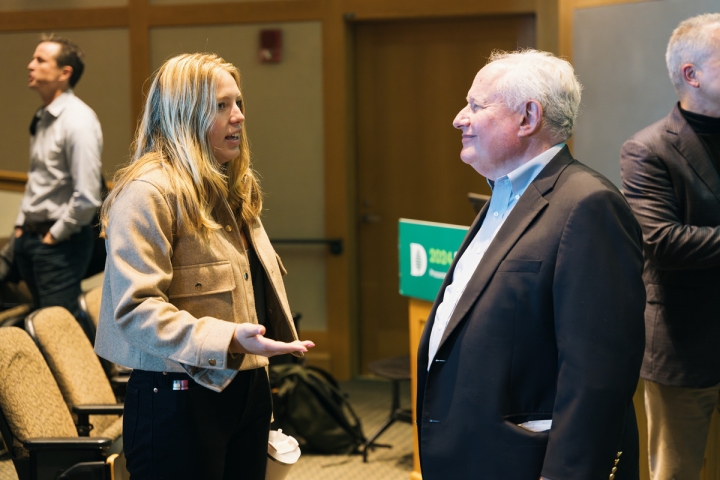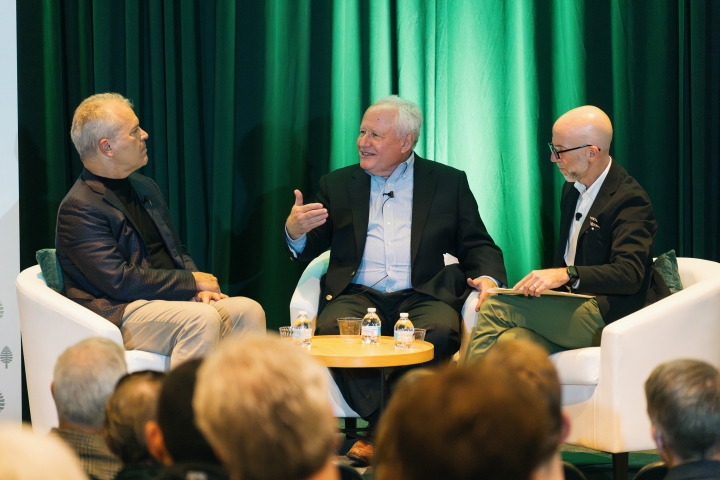While Vice President Kamala Harris will likely carry the popular vote over former President Donald Trump next month in the race for the White House, whether she wins the Electoral College is the great unknown, conservative commentator William Kristol said Thursday evening.
“It’s a very close race. I think it is as tight as it seems,” Kristol told an audience of 150 at Filene Auditorium, with another 110 watching via livestream, as part of Dartmouth’s 2024 Election Speaker Series, co-sponsored by the Nelson A. Rockefeller Center for Public Policy and Dartmouth Dialogues.
Kristol served in both the Reagan and George H.W. Bush administrations and in 1995 founded The Weekly Standard, which became a bible of sorts for the mainstream conservative movement. He is now an editor-at-large with the Never Trump site The Bulwark and also the founding director of Defending Democracy Together, an organization devoted to safeguarding America’s liberal democratic norms, principles, and institutions.
On the whole, Kristol, who left the Republican Party in opposition to a Trump candidacy and presidency and who is supporting Harris for president, was relatively sanguine about the U.S.’s ability to withstand a second Trump term on the domestic front because of the traditional guardrails of the Constitution and the judiciary.
“I think you could argue that domestically we still have a lot of guardrails,” Kristol said. It’s Trump’s possible effect on foreign policy that concerns him.
“In foreign policy, the president has much more power. He has huge discretion on the use of force,” which could shape Trump’s policy toward Ukraine, NATO, Iran and Israel, with the potential to radically alter what has been a fairly consistent, internationalist American foreign policy.
The transformation of the Republican Party into a Trump party is partly a case of Trump giving voice to the more isolationist, xenophobic strands of the GOP, Kristol said.

“The recessive genes in the Republican Party have now emerged as the dominant genes. You can say it was always there. Part of politics in a huge country like ours—when you don’t get to tell every single person in the party what to believe—is keeping the recessive genes recessive,” Kristol said.
The current manifestation of the Republican Party could do severe damage, even if it is not irrevocable damage, Kristol said, pointing to Trump’s incendiary language on immigration and vice presidential candidate J.D. Vance’s controversial prescriptions for and descriptions of American women.
“Once you unleash all these passions and the grievances and anxieties and rhetoric, it’s very hard to put the toothpaste back in the tube. More people get used to it, and some people even like it,” Kristol said, alluding to the recent slurs about Haitian immigrants in Ohio. “It’s not funny, demonizing a small and recent immigrant group. We’ve had this before in American history.”
One of the unfortunate outcomes of such political turmoil is that “good people leave politics,” Kristol added.
Kristol said that Harris has run a largely effective campaign. In the debate with Trump, she demonstrated mental toughness and agility. That her campaign was “able to build the plane as they were flying it the first five weeks is very impressive,” he said.
However, because of the extraordinary circumstances in June and July of President Joe Biden’s bungled debate with Trump, the first attempted assassination of Trump, Biden’s decision to step down, and Harris’s smooth ascension to the top spot, the compressed timeline of the election means that many voters don’t yet have a real sense of who Harris is, and what she stands for, Kristol said.
Typically presidential candidates are vetted over months as they go through primaries, debates and interviews, he noted.

The election could come down to the voting patterns of white college-educated women versus white college-educated men, Kristol said. A recent CNN poll found a gender gap among independents, with 51% of women supporting Harris to 36% for Trump. He held a 7 percentage point advantage among independent men, the poll found.
“The gender gap is a big thing. Trump has put it on steroids, so to speak. It looks like it could be bigger in this election than it’s ever been.” Kristol speculated that women married to, or in relationships with Trump supporters, might secretly vote for Harris, just as “there was a secret Trump vote in 2016” that polling didn’t detect.
But Trump also is a survivor, said Kristol. Despite the attempted insurrection of Jan. 6, 2021, federal indictments, and a guilty verdict in a New York City court on the charge of falsifying business records in New York, he has staying power. His political base shows no signs of abandoning him.
“I hate to say this,” Kristol said, but should Trump retake the White House “it would be one of the greatest comeback stories in American political history.”
After his speech, Gemma Stowell ’27 appreciated Kristol’s explication of what conservatism means in his view: preserving a liberal constitutionality. “It changed my view on what conservatism is,” Stowell said
“Kristol occupies a unique place and has been there for a lot of big moments,” said Varun Swaminathan ’26. “The fact that he’s throwing his support behind Harris says a lot about old school conservatism.”
The speaker series, which began Tuesday with a talk by legal scholar Sherrilyn Ifill, features 10 speakers, including Vice President Mike Pence, U.S. Sen. John Fetterman, D-Pa., and polling expert Harry Enten ’11. Jennifer Harris, a former special assistant to the president and international economics aide on the National Security Council and National Economic Council in the Biden administration, is the next speaker, on Oct. 10.
The series is open to the public. Tickets are free with registration. For some events, all seats have been reserved, but there is a waitlist and online viewing is available.

